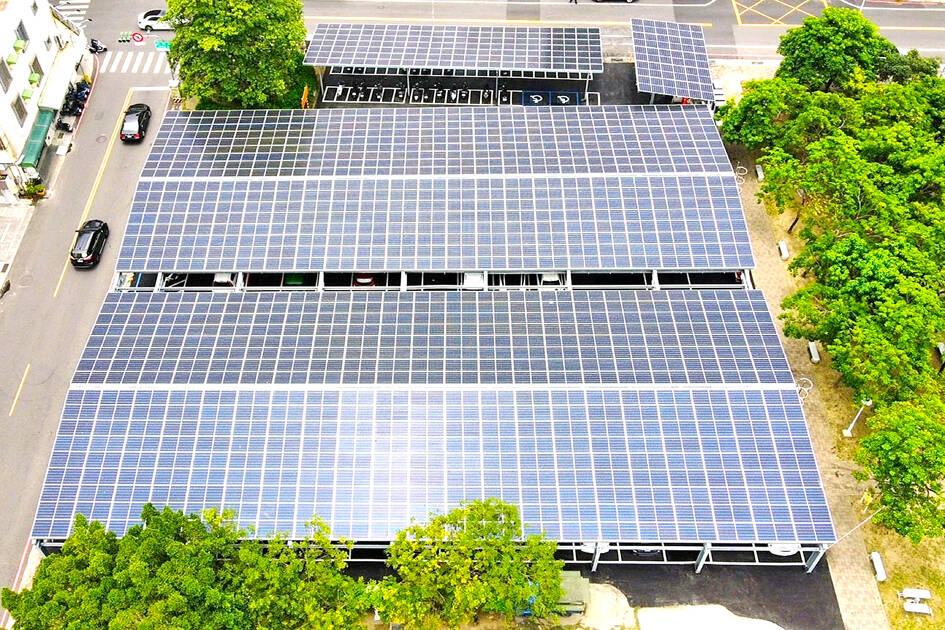Renewable energy sources are expected to make up 10 percent of total electricity production this year, Bureau of Energy officials said, buoying hopes that the nation’s green energy transition will get back on track following years of disappointing progress amid the COVID-19 pandemic.
Last year, more solar farms than any other year were built in Taiwan, and the pace of construction of offshore wind turbines increased as contractors gained experience, the officials said.
These developments — in conjunction with a projection that the nation’s energy consumption would decrease this year — would put Taiwan within reach of the Ministry of Economic Affairs’ revised target of boosting renewable energy sources to 20 percent of electricity production by 2026, they said.

Photo courtesy of Tainan Bureau of Transportation via CNA
The ministry last month extended the deadline for getting 20 percent of the nation’s electricity from renewable sources by a year after delays caused by pandemic-related work and supply chain disruptions.
Under the new plan, solar energy production must be increased from a previous target of 10 gigawatts (GW) to 14GW by the end of the year.
The bureau has installed enough solar panels over fish farms to generate 2.5GW of energy, of which 2GW was integrated into the grid, and 0.5GW is to go online in the next three months, they said.
To expand solar energy production this year, the government would seek to install solar panels over fish farms in Tainan and Chiayi County, low-yield agricultural land owned by Taiwan Sugar Corp (台糖) and at the Changhua Coastal Industrial Park (彰濱工業區), they said.
A new wind farm off southwestern Changhua County is already online, they said.
By the end of the year, three solar farms off Changhua and the Formosa II wind power project off Miaoli County would also be activated, adding 0.8GW to the nation’s energy supply, they said.
The renewable energy sources last year made up 8.6 percent of the nation’s total electricity production, and no significant problems are foreseen in reaching the 10 percent target set for this year, they said.

INVESTIGATION: The case is the latest instance of a DPP figure being implicated in an espionage network accused of allegedly leaking information to Chinese intelligence Democratic Progressive Party (DPP) member Ho Jen-chieh (何仁傑) was detained and held incommunicado yesterday on suspicion of spying for China during his tenure as assistant to then-minister of foreign affairs Joseph Wu (吳釗燮). The Taipei District Prosecutors’ Office said Ho was implicated during its investigation into alleged spying activities by former Presidential Office consultant Wu Shang-yu (吳尚雨). Prosecutors said there is reason to believe Ho breached the National Security Act (國家安全法) by leaking classified Ministry of Foreign Affairs information to Chinese intelligence. Following interrogation, prosecutors petitioned the Taipei District Court to detain Ho, citing concerns over potential collusion or tampering of evidence. The

‘FORM OF PROTEST’: The German Institute Taipei said it was ‘shocked’ to see Nazi symbolism used in connection with political aims as it condemned the incident Sung Chien-liang (宋建樑), who led efforts to recall Democratic Progressive Party (DPP) Legislator Lee Kun-cheng (李坤城), was released on bail of NT$80,000 yesterday amid an outcry over a Nazi armband he wore to questioning the night before. Sung arrived at the New Taipei City District Prosecutors’ Office for questioning in a recall petition forgery case on Tuesday night wearing a red armband bearing a swastika, carrying a copy of Adolf Hitler’s Mein Kampf and giving a Nazi salute. Sung left the building at 1:15am without the armband and apparently covering the book with a coat. This is a serious international scandal and Chinese

Seventy percent of middle and elementary schools now conduct English classes entirely in English, the Ministry of Education said, as it encourages schools nationwide to adopt this practice Minister of Education (MOE) Cheng Ying-yao (鄭英耀) is scheduled to present a report on the government’s bilingual education policy to the Legislative Yuan’s Education and Culture Committee today. The report would outline strategies aimed at expanding access to education, reducing regional disparities and improving talent cultivation. Implementation of bilingual education policies has varied across local governments, occasionally drawing public criticism. For example, some schools have required teachers of non-English subjects to pass English proficiency

TRADE: The premier pledged safeguards on ‘Made in Taiwan’ labeling, anti-dumping measures and stricter export controls to strengthen its position in trade talks Products labeled “made in Taiwan” must be genuinely made in Taiwan, Premier Cho Jung-tai (卓榮泰) said yesterday, vowing to enforce strict safeguards against “origin laundering” and initiate anti-dumping investigations to prevent China dumping its products in Taiwan. Cho made the remarks in a discussion session with representatives from industries in Kaohsiung. In response to the US government’s recent announcement of “reciprocal” tariffs on its trading partners, President William Lai (賴清德) and Cho last week began a series of consultations with industry leaders nationwide to gather feedback and address concerns. Taiwanese and US officials held a videoconference on Friday evening to discuss the